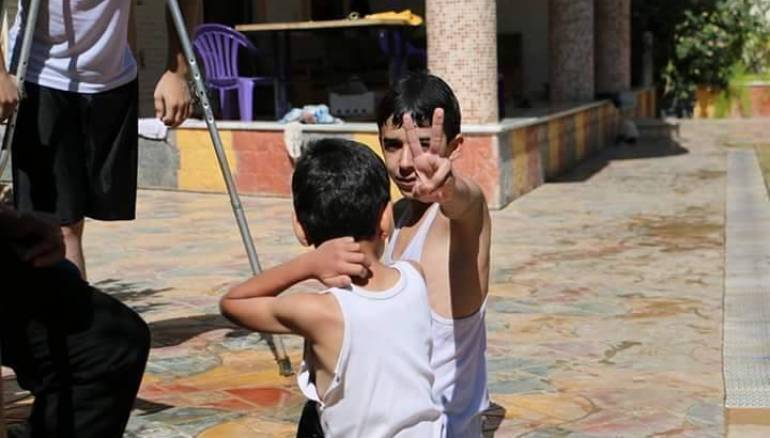Razan Khaebbiya, a Syrian engineer, has devoted herself to helping children of the Eastern Ghouta suburbs near the capital, especially those with special needs who have been injured during the course of the war.
A year ago, Khaebbiya set up a project under the name the "Human Hope Team" to ease the pain of suffering children, but the project was stopped because of the difficult conditions due to ongoing war, internal fighting and checkpoints.
Despite studying at Damascus University, Khaebbiya’s desire to help child victims of war overshadowed all other commitments, especially when witnessing dozens of children drop out of school or fail to receive medical treatment.
At the beginning of the war, Khaebbiya's father was arrested along with several members of her family in the regime’s random arrests in the city of Douma. This pushed her to relocate to the Ghouta district on the outskirts of capital, determined to restart her life and help her remaining family.
Working first as a teacher and then in the humanitarian field for the most vulnerable and poor cases in the community, Khaebbiya said: “I saw with my own eyes the extent of the suffering experienced by people, especially in light of the economic embargo that the city experienced in 2014."
As she continued to work in the field, Khaebbiya had the idea of helping children with special needs especially those with amputation. Her project idea was presented to the local council in the Ghouta and was approved shortly after.
The young woman explained that although the project lasted only six months, she was able to help many children and provide prosthetic limbs with the help of the Farah Artificial Limb Center in the Ghouta. The conflict, heightened security and the cessation of material support prevented the completion of the project. So Khaebbiya was forced to work individually again, helping the children of Douma in the same way.
She said that she is now considering starting a project in cooperation with the Douma local council to help people with spinal cord injuries.
The activist noted she encounters many challenges as she lives in an area that is under continuous bombardment by regime forces, adding that the community’s confidence in her has increased her workload and humanitarian responsibilities, subsequently increasing the number of cases in need of assistance.
She explained that she aims to establish a center for injured children to provide treatment and education for them and aid their integration into society.
Since she began, Khaebbiya’s work has helped to win the hearts and love of the community and encourage it to carry on her noble task which she has devoted herself to despite the difficulties.
This article was edited by The Syrian Observer. Responsibility for the information and views set out in this article lies entirely with the author.


